Is BlackBerry getting out of a Jam?
Is this enough to save the ailing Canadian firm?
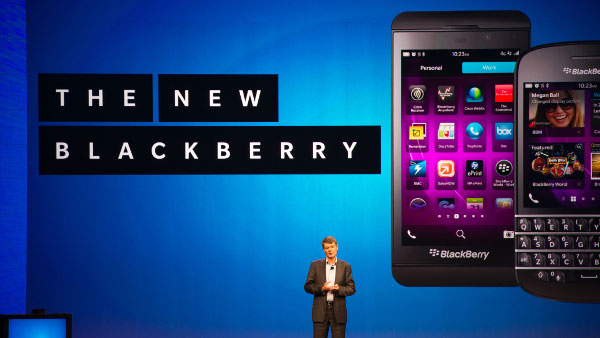
Did the BlackBerry Z10 launch fall a bit flat? Not from where BlackBerry is sitting. "The feedback has been incredible," UK MD Rob Orr told us at the BlackBerry Jam developer event.
"And that's feedback right across the market, from developers to enterprise customers to walk-in buyers to the senior management in the mobile networks and the retailers, down to the Saturday store staff."
BlackBerry doesn't release sales figures itself; that's up to the retailers such as Carphone Warehouse and Phones 4U, or to market researchers GfK, but the stories about people walking into London stores such as Selfridges and buying 10 BlackBerry devices at a time? "There's been a lot of that," he claims. "And that's before we started the advertising…"
Want to sell a lot of phones? You need the mobile networks behind you - from the staff in phone shops who get asked for advice to the executives who decide on tariffs, special offers and which phones to put in their adverts.
The networks do a good job of sounding excited about all the new handsets that come along, but what's impressive is that BlackBerry can produce senior figures at every UK phone network who seem to actually understand the new features in BlackBerry 10.
Equally on side are the technical teams who test phones before they're allowed on the network. Testing can hold up your phone; look at how long it takes operators to approve new updates for Windows Phone. That makes it more impressive that some of them worked through Christmas to get BlackBerry Z10 handsets approved so they could go on sale quickly after launch.
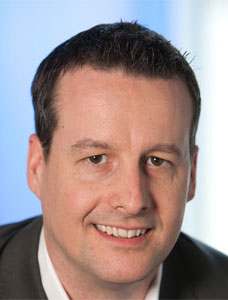
Because BlackBerry didn't want to wait for Mobile World Congress 2013, with its flood of announcements and launches, timing was tight to find and fix any issues and get phones in boxes and on the shelves.
Sign up for breaking news, reviews, opinion, top tech deals, and more.
Instead of dragging their feet, the networks pitched in. "Over Christmas they had warehouses opening, labs opening," Orr told TechRadar. "The kit was coming through and we had testing taking place between Christmas and the New Year break to get us to the launch date - and that's quite rare. It's quite a rare thing for them to come out and say 'this is different, this is special and we are behind it'."
Why so helpful? "We're an important part of their business today. We're comfortably the third place platform in the UK market - and this helps me solidify that position and ultimately start to make inroads and grow it from where we are today."
BlackBerry and the competition
Where BlackBerry is today is, of course, behind iPhone and Android. We asked European MD STephen Bates: What has BlackBerry learned from the success of other devices?
"The difference between us and others is the choice we took - which was a hard choice. To develop a completely new platform has given us the ability to create a different user experience," he admitted.
"That's something that you cannot get if you were to OEM it from a third party. What the competition has done is setting this concept of an app grid. That's a great user experience and what we've done is taken that and moved it on to have a fresher, smoother, more integrated feel.

"It's about the flow, the gestures. With up to eight apps open and with your social networks in the hub, if you add it up you've probably got 15-16 things and the ability to flow across them and keep the context of what you're doing. That's a unique experience."
Bates is happy to admit that BlackBerry has learned lessons. "We haven't been perfect. We've learned a lot in the last two years and we've tried to take those learnings and build a new better BlackBerry.
"We've used this time to spend a lot of time talking to customers about what is the essence of BlackBerry; what do you like, what you do not like? For BlackBerry 10 we wanted to keep the essence of what BlackBerry is about and deal with the disqualifiers."
The essence of BlackBerry isn't just the keyboard or BBM, important as those are. "To me fundamentally it's a communications device where we deliver a capability to people who naturally multitask, who want to get lots of things done," added Bates.
We can flow across these worlds and enable you to interact with all the networks you want to connect with, be it Facebook, Twitter, BBM, Foursquare, Whatsapp, Skype - we don't care. Whatever your flavour of communications is, we want to deliver unique fast experiences, and that's what the hub is all about."
Plus there was dealing with the places BlackBerry was behind; Bates calls those table stakes, things BlackBerry just had to get right.
"We solved the classic reasons why people don't stay with BlackBerry; the browser, the apps, multimedia. We've now got probably the best browser. We've got a very competitive app market. Multimedia; the screen is simply beautiful."
Beauty is in the eye of the beholder of course; if you were hoping for dedicated apps, having iPlayer and YouTube open in the browser may be a surprise, but it is a browser that plays Flash and gets a higher score for HTML5 compatibility than the desktop versions of Chrome and Firefox.
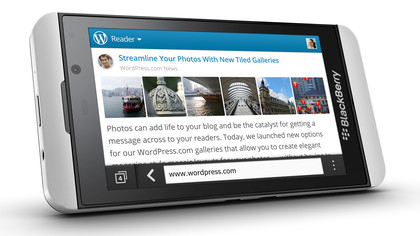
(Sneakily, the browser has a new user agent, which means a site that's sending older BlackBerry users to a mobile version will give BB10 users the full desktop site because it won't recognise the agent.)
The 4.2-inch screen is larger than the iPhone 5's screen, and the 1280 x 760 resolution beats it and matches the Google Nexus 4 and Nokia Lumia 920. The pixel density is lower than the iPhone's retina display, but videos look more than acceptable and you have the HDMI out to push movies to a larger screen at 1080p as well.
Certainly, this is a world away from the low resolution screen and clunky video player in BB7, especially when you look at apps such as Nobex, which now plays video podcasts as well as internet radio stations.
And yes, it did take a push from other handset makers to get here. Or as Bates puts it with a more positive spin; "the consumer wins in all this because we've moved on; we've brought something fresh, we've brought something new. It's a great demonstration of the power of that competitive market."
The keyboard is coming
Around April the BlackBerry Q10 goes on sale. Why bring out a touchscreen phone first when BlackBerry is known for its physical keyboard?
Orr says this isn't just BlackBerry hedging its bets. "The reason we launched the touchscreen device first is because the BB10 platform was built as a gesture-based touch interface. We have gestures for peek and flow and the way we reinvented the experience is best showcased in a purely touch environment.
"But we built the keyboard phone because the BlackBerry base is very loyal to that tactile physical interface."
It also gives BlackBerry more time to get the right content. Some big name apps are ready (Facebook, Twitter, TuneIn and Angry Birds) with others "committed" to BlackBerry 10 but not launched yet (Skype, Kindle and Whatsapp), and BlackBerry "in talks" about getting Netflix and Instagram too.
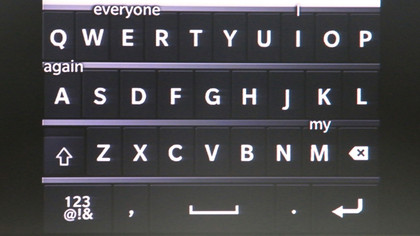
It's disappointing that big names are waiting until BlackBerry has more users to finish delivering their apps (and there's no sign of Spotify, which just came out in beta for Windows Phone 8).
"We're going out and making sure we have specific apps and services that matter for this market, that we have the movies and music and content and shows that people want. So we have the BBC back catalogue and the ITV back catalogue in BlackBerry World," Orr points out when speaking on the benefits of BB10 in the UK.
"Things like having the tube map is important. BBC iPlayer is available on the device; that's important for the UK. New things will pop out and we need to jump on them."
It's interesting to note that BlackBerry World isn't filled with ported Android apps; those make up only 15% of the 70,000 apps at launch, and over half are native apps built in BlackBerry's own hardware-accelerated Cascades framework.
Orr echoed CEO Thorsten Heins, who called the launch the starting line rather than the finish line (which is especially true in the US, where the BlackBerry Z10 isn't available yet. "This is the start of the next 10 years of our evolution. There will be lots of exciting innovations and improvements along the way."
The first of those comes on the BlackBerry Q10 as a new feature called Type and Go. If you just start typing when you're not in an app, the BlackBerry will treat it as a command. Type 'email Paul' or 'BBM Dan' and that's what you'll find yourself doing.
Developers will be able to add these hotkeys to trigger their own apps, so you could start typing to open your favourite internet radio station or iPlayer channel. And yes, you'll be able to do that on the touch keyboard of the BlackBerry Z10 at some point.
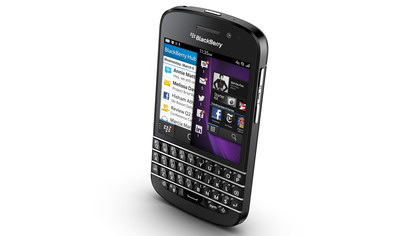
"When we get an update [to BB10.1], it will come to the BlackBerry Z10 as well," head of software Vivek Bhardwaj told us. The main question is how to make it work without feeling like more work than just swiping across and opening the app with your thumb, which is why Type and Go is on the BlackBerry Q10 first.
There's no date for that BlackBerry Z10 update, or for getting BB10 on the BlackBerry PlayBook, but "BlackBerry 10 will be coming to the PlayBook at some point later this year," vice president Alec Saunders confirmed to us.
Mary (Twitter, Google+, website) started her career at Future Publishing, saw the AOL meltdown first hand the first time around when she ran the AOL UK computing channel, and she's been a freelance tech writer for over a decade. She's used every version of Windows and Office released, and every smartphone too, but she's still looking for the perfect tablet. Yes, she really does have USB earrings.